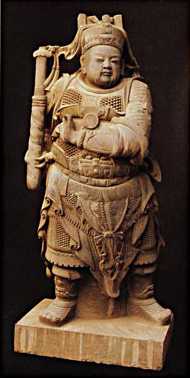Guan Ping
| Guan Ping | |
|---|---|
| General of Liu Bei | |
| Born | (Unknown) |
| Died | 219 |
| Names | |
| Simplified Chinese | 关平 |
| Traditional Chinese | 關平 |
| Pinyin | Guān Píng |
| Wade–Giles | Kuan P'ing |
Guan Ping (died 219)[1] was a military general serving under the warlord Liu Bei in the late Han Dynasty. He was the eldest son of Guan Yu. Little about him is documented in historical records except that he was captured along with his father west of Maicheng (麦城, southeast of present day Dangyang, Hubei) by the forces of Sun Quan in 220. Both were promptly executed.
Guan Ping appears in the 14th century historical novel Romance of the Three Kingdoms by Luo Guanzhong. In chapter 28, he was adopted by Guan Yu when he was 17 years old because his father requested to have him follow and assist Guan Yu. As Guan Yu did not have any children then, he adopted Guan Ping as his son.
Since the deification of Guan Yu in the Sui Dynasty, Guan Ping and Zhou Cang (sometimes including Liao Hua) would often appear at the sides of Guan Yu in statues placed in temples and shrines. In portraits, the trio would often appear together as well. Guan Ping's face is traditionally painted white, is a stark contrast to Zhou Cang's coal black complexion, while Guan Yu's tends to be shades of red.
In fiction
In the novel Romance of The Three Kingdoms, Guan Ping was the second son of a farmer named Guan Ding. When Guan Yu visited Guan Ding's farm in AD 200, Guan Ping, his father, and his brother Guan Ning came out to meet Guan Yu and offer him shelter for the night. Guan Yu quickly took an interest in him and Guan Ping soon became Guan Yu's adopted son. Later, Liu Bei went on to Gucheng and, along with Guan Ping and several other commanders, built up a force of several thousands, including infantry and cavalry. When Liu Bei learned that Cao Cao was on a campaign against Yuan Shao in the north, he left Liu Pi to guard Runan and began his march onto the capital. Guan Ping was chosen to join the expedition. Before Liu Bei reached Xuchang, Cao Cao caught word of his advance and rushed back to the city to join in its defence. Liu Bei suffered many casualties in battle, including the death of Liu Pi, and he eventually ran to a valley blocked by Cao's general Zhang He. Learning of Liu Bei's peril, Guan Ping, along with Guan Yu and Zhou Cang, led 300 men to rescue Liu Bei and cut a bloody path into Zhang He's ranks, forcing Zhang to retreat.
In 207, Cao Cao led an army of 100,000 to attack Xinye. Zhuge Liang, who was now serving as Liu Bei's military advisor, ordered Guan Ping and Liu Feng to take 500 men with combustible materials and wait on either side of the area beside Bowang slope. As Cao Cao's vanguard general Xiahou Dun approached Bowang slope in pursuit of Zhao Yun, Guan Ping and Liu Feng waited until Xiahou Dun had advanced enough past their own position. As he did, Guan Ping ordered his men to set fire to the surrounding undergrowth, trapping Xiahou Dun and his men in a spreading inferno. Many of Xiahou Dun's men were killed in the ambush, but Xiahou himself was able to escape.
Guan Ping would later go on to join Liu Bei's expedition to capture Yi Province, which was in control of Liu Zhang at the time. Upon arriving at Luoxian, Guan Ping successfully managed to capture its eastern encampments along with Liu Bei and Liu Feng. Guan Ping would later go on to serve his father in the defense of Jing Province. In 219, Guan Yu and Guan Ping led an expedition against Cao Cao's stronghold at Fancheng, leading to the Battle of Fancheng. After having some initial success against Cao Cao's general Cao Ren, Guan Yu's army would be isolated and surrounded by Sun Quan's forces commanded by Lü Meng. Guan Ping and his father were then forced to retreat to Maicheng, where they were soon encircled. After Guan Yu's officer Liao Hua failed to receive reinforcements from Liu Feng and Meng Da, Guan Yu and Guan Ping were forced to try to escape on their own. However, the two were soon ambushed and captured by Lü Meng's troops, who brought the captives to Sun Quan. After several failed attempts to persuade Guan Ping and Guan Yu to surrender, Sun Quan had the Guans executed by beheading.

Modern references
Guan Ping appears as a playable character in Koei's Dynasty Warriors and Warriors Orochi video game series.
See also
References
- Chen Shou (2002). Records of Three Kingdoms. Yue Lu Shu She. ISBN 978-7-80665-198-8.
- Luo Guanzhong (1986). Romance of the Three Kingdoms. Yue Lu Shu She. ISBN 978-7-80520-013-2.
- Lo Kuan-chung; tr. C.H. Brewitt-Taylor (2002). Romance of the Three Kingdoms. Tuttle Publishing. ISBN 978-0-8048-3467-4.